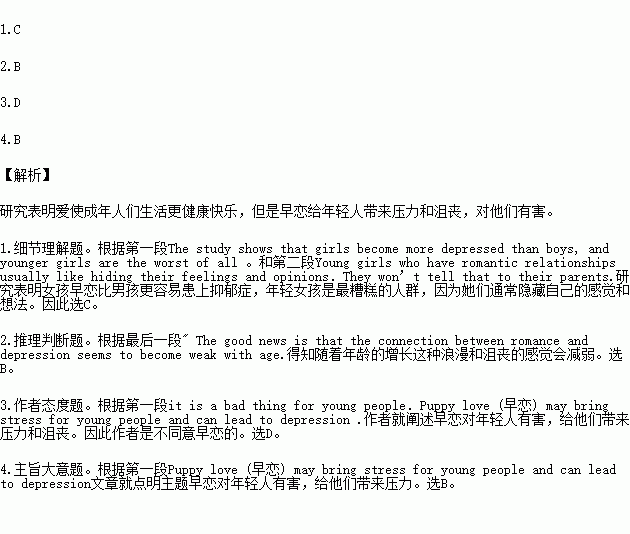题目内容
A new research of 8,000 young people in the Journal of Health and Social Behavior shows that although love can make adults live healthily and happily, it is a bad thing for young people.Puppy love (早恋) may bring stress for young people and can lead to depression .The study shows that girls become more depressed than boys, and younger girls are the worst of all.
The possible reason for the connection between love and higher risk of depression for girls is “loss of self”.According to the study, even though boys would say “lose themselves in a romantic relationship”, this “loss of self” is much more likely to lead to depression when it happens to girls.Young girls who have romantic relationships usually like hiding their feelings and opinions.They won’t tell that to their parents.
Dr Marian Kaufman, an expert on young people problems, says 15% to 20% young people will have depression during their growing.Trying romance often causes the depression.She advises kids not to jump into romance too early.During growing up, it is important for young people to build strong friendships and a strong sense of self.She also suggests the parents should encourage their kids to keep close to their friends, attend more interesting school activities and spend enough time with family.
Parents should watch for signs of depression—eating or mood changes —and if they see signs from their daughters or sons, they need to give help.The good news is that the connection between romance and depression seems to become weak with age.Love will always make us feel young, but only maturity gives us a chance to avoid its bad side effects.
1.Which of the following is more likely to have depression?
A.Young people who have a strong sense of selfishness.
B.Young boys whose parents watch for their behavior.
C.Young girls who always hide their feelings and opinions.
D.Careless parents whose children are deep in love.
2.What can be inferred from the passage?
A.Lacking love can lead young people to grow up more quickly.
B.The older a woman is,the less likely she seems to lose herself in romance.
C.Early love makes young people keep close to their friends and parents.
D.Parents should help their children to be aware of the signs of depression.
3.What’s the author’s attitude towards puppy love?
A.Confused.
B.Disinterested.
C.Scared.
D.Disapproving.
4.What’s the main idea of the passage?
A.Parents should forbid their children’s love.
B.Puppy love may bring young people depression.
C.Romance is a two ? edged sword for adults.
D.Romance is good for young people.

